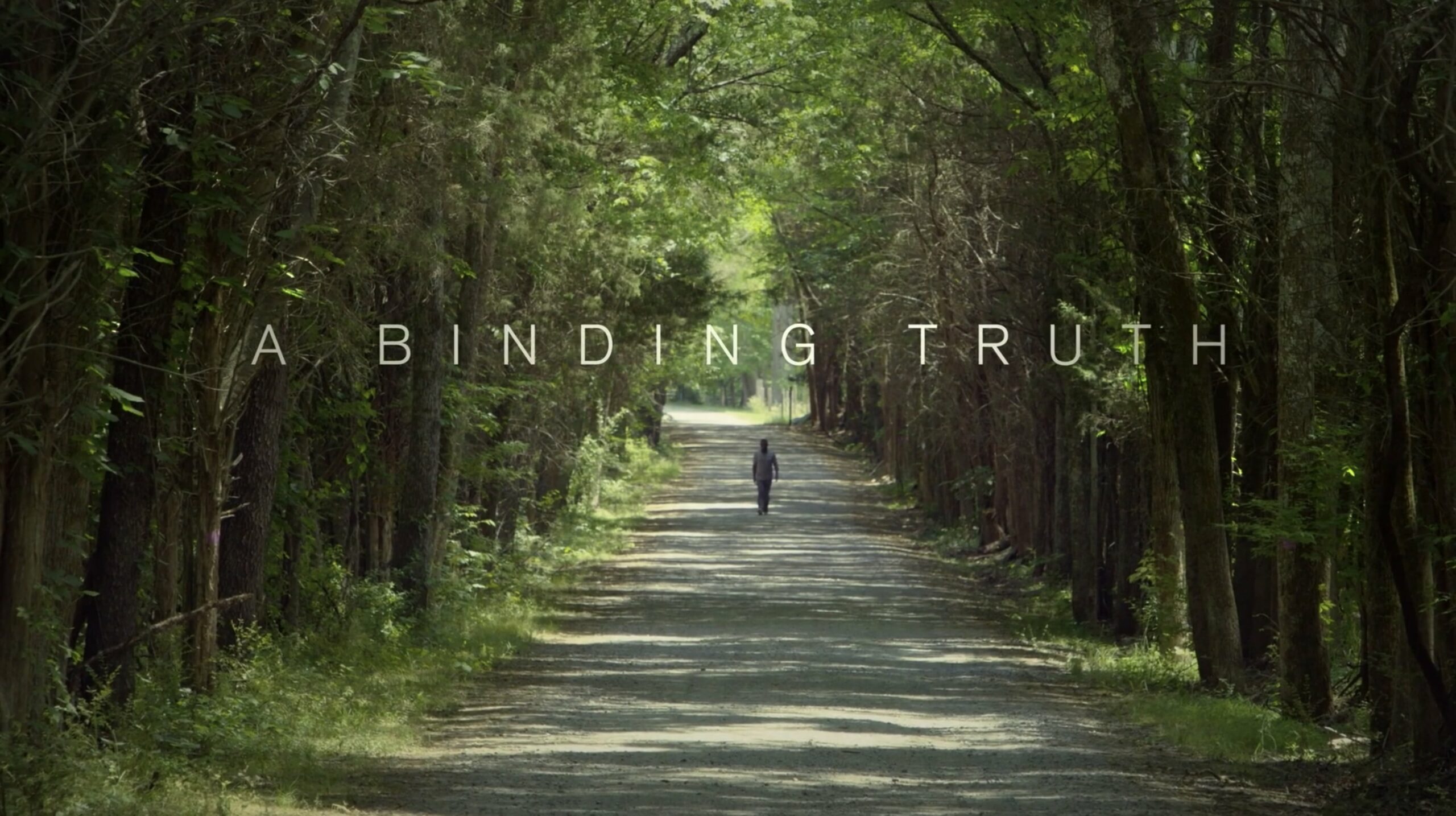A Binding Truth

Description
(formerly titled Mecklenburg County)
They were high school classmates in 1965. Jimmie transferred his senior year to an affluent high school in Charlotte – he was their first Black football star. That decision swept him into one of North Carolina’s most volatile civil rights cases, played out at the explosive intersection of football and race. Fellow classmate De watched that case unfold and wrote about it in his college essay application. Decades later, a shocking discovery reveals secrets buried in church records, reconnecting the two men and changing their lives. Their story, rooted in the South, is also America’s story – one of slavery’s legacy and our current racial divide. It’s a story of healing and shows a way forward as Jimmie and De explore their binding truth.
Full Synopsis
A central character of this true story is Jimmie Lee Kirkpatrick, who in 1965 made a decision that changed history and swept him into one of North Carolina’s most volatile civil rights cases, played out at the explosive intersection of football and race.
Jimmie Lee grew up in an all-black, close-knit community on the outskirts of Charlotte, in Mecklenburg County. His father left the family when Jimmie Lee was 11 years old and he was raised by his mother and grandparents. His great-grandmother worked for a wealthy white Charlotte family as a domestic worker and a cook. It was a time when there were separate white and black drinking fountains and negative consequences for crossing societal lines.
A gifted athlete, like his dad, Jimmie was a sensational running back, one of the best in North Carolina. He became deeply conflicted when a school boundary changed and presented him with a choice for his senior year: Stay with friends and teammates at all-black Second Ward High, or move to affluent, white Myers Park High, that offered many more opportunities.
Almost 50 years later, in 2013, a Charlotte Observer newspaper series told of the connections between Jimmie Lee’s undefeated 1965 football season at Myers Park, a high-stakes civil rights case filed by Julius Chambers against the Shrine Bowl – the result of Jimmie not being selected to play in the iconic all-star game – and the bombings of four civil rights leaders’ homes in Charlotte. Jimmie Lee said then he lives in two worlds: “I see my white friends and my black friends, but never together.”
Among those who read the Observer articles was De Kirkpatrick, a forensic psychologist and a white high school classmate of Jimmie Lee’s. The two weren’t friends at Myers Park, but, because of their last name, had jokingly called each other “cuz.” They made plans to talk for the first time in nearly 50 years. Many of those years, Jimmie Lee was in search of his genealogy, a complicated family history, and his own identity. In a shocking phone call, he shared with De what he had discovered – that their connection went back far further than high school, to a plantation in Mecklenburg County on the eve of the Civil War. “Your great-great-grandfather owned my great-great-great grandfather.”
This truth stunned De. Learning that his ancestors were slave owners was a life-changing moment and sparked a journey for both men at age 65. “Put aside your guilt and I’ll put aside my anger,” Jimmie Lee said to De, “and we have a chance to learn from each other.” Although this story is rooted in the South, it is also America’s story – one of slavery’s legacy, present-day racial divide, and the hope that by learning from each other, we can heal deep wounds that many of us have never faced.
Director/Producer
Louise Woehrle owner of Whirlygig Productions is a passionate storyteller whose mission is to shine a light on stories that need to be told with the hope they will serve as catalysts for change, promote healing and connect us as human beings. She’s a multi-award-winning filmmaker whose various projects represent narratives that are culturally diverse with a global reach. Her most recent documentary Stalag Luft III – One Man’s Story (‘19) is a story of grit and grace about her Uncle Charles Woehrle who flew in the Mighty Eighth in WWII was shot down and taken prisoner in Stalag Luft III for two long years. The film has received three festival awards in 2019, including “Best of Fest” at the 42nd Minneapolis-St. Paul International Film Festival, Audience Award for “Best Documentary” at the 20th Port Townsend Film Festival, and Audience Award for “Best Feature Documentary” at the 39th Breckenridge Film Festival. Woehrle’s feature documentary work also includes The Pathway (‘15) about a progressive school in Southern India changing lives. (co-director); Pride of Lions (‘10) about the people of Sierra Leone overcoming an 11-year civil war. The film has been acquired by 140 colleges and universities. (co-director/producer); Souvenirs: Healing After War (‘11) about a Vietnam Vet trying to survive the war and his family who loves him. (producer); Sweet Blood (‘08) about the epidemic of diabetes in the Cree communities in Northern Ontario and what the people there are doing to change that. (writer/producer); Bushido (‘06) a story of WWII enemies, one American, and the other Japanese who become dear friends 40 years after the war through a Samurai sword. (producer); Grandfather’s Birthday (‘01) starring Robert Prosky – a short dramatic film about a Grandpa who finds himself alone on his birthday. (executive producer/casting) – winning a Regional Emmy award. Additionally, Louise has directed and produced many films for nonprofits that include the Cree Health Board, Veteran Voices (Minnesota Humanities Center), Feed My Starving Children, Pepperdine University Women in Leadership, Fairview Hospice and many more. Woehrle’s new project in development is Mecklenburg County. To learn more about Louise and her work, please visit her website: whirlygigproductions.com
